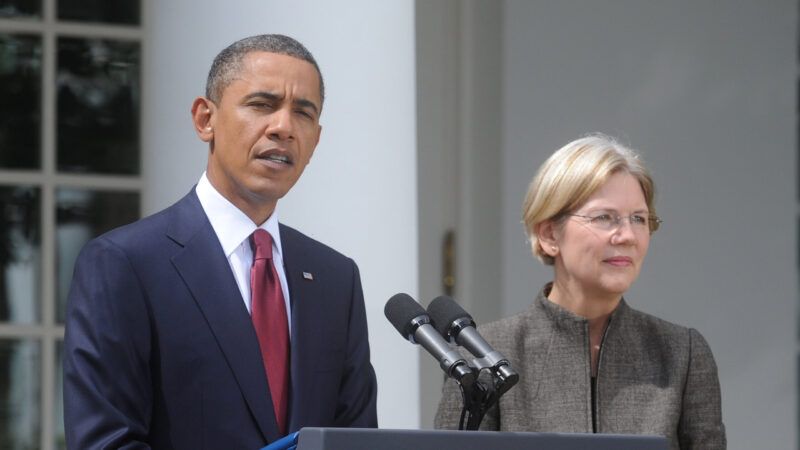Consumer Financial Protection Bureau
Elizabeth Warren's Hubris Allowed Trump To Defund the CFPB
Instead of isolating the CFPB from Congress' budget-making authority, Warren and former President Barack Obama made it easier for a president to effectively shut it down.

Since at least the days of the ancient Greeks, humans have known that one way to write a compelling story is by including a bit of hamartia—a tragic flaw.
Sometimes that is a physical shortcoming—Achilles had that famously vulnerable heel—but it is often more interesting if the flaw is a more innate thing tied to a character's understanding of themselves. Hubris, or excessive pride, is the famous one. After all, it wasn't really Achilles' unprotected heel that took him down, but his false belief that his mother had made him invulnerable.
You might say the exact same thing about the Consumer Financial Protection Bureau (CFPB). It could be headed into a sort of coma later this year because of a fatal flaw embedded by its own parents: Sen. Elizabeth Warren (D–Mass.) and former President Barack Obama.
Unlike every other department and agency within the federal government, the CFPB is not funded via congressional appropriations. Instead, its funding flows directly from the Federal Reserve. Each year, the White House submits a budget to the Federal Reserve, and the central bank hands over the necessary amount—$729.4 million last year, in case you were wondering.
For a long time after the CFPB was created in 2010, there were serious questions about the constitutionality of that structure. That finally got resolved last year, when the Supreme Court ruled that Congress was within its powers to hand off the purse strings. So, funding the CFPB via the Federal Reserve is not unconstitutional—it's just unorthodox and foolish.
Here's where the hubris enters the story. When Warren and Obama created the CFPB, they designed that unorthodox funding structure specifically to prevent a future Republican-led Congress from trying to defund the bureau. Remember, this was in the age when Republicans were running around the country telling voters they intended to repeal Obamacare too. By isolating the CFPB from Congress' budgetary powers, Warren was trying to make it invulnerable to attack.
Instead, she simply gave it a fatal flaw.
Earlier this week, the Trump administration submitted its CFPB funding request to the Federal Reserve. It asked for…$0.
"Pursuant to the Consumer Financial Protection Act, I have notified the Federal Reserve that CFPB will not be taking its next draw of unappropriated funding because it is not 'reasonably necessary' to carry out its duties," wrote Russ Vought, director of the White House's Office of Management and Budget (OMB), wrote on X on Saturday night. "The Bureau's current balance of $711.6 million is in fact excessive in the current fiscal environment. This spigot, long contributing to CFPB's unaccountability, is now being turned off."
That appears to be the end of the CFPB, at least until a Democrat returns to the White House. Trump will need an act of Congress if he seriously wants to abolish the Department of Education, for example, and even minor spending cuts being made across the executive branch will eventually need congressional or legal consent to be permanent. But there should be no serious questions about whether the president can unilaterally defund the CFBP. Congress has no role to play in that fight.
Like Thetis dipping her infant son in the river Styx to grant him near-invulnerability—except for the heel she was holding—Warren thought she was making the CFPB an unstoppable force. Instead, she left its fate in the hands of President Donald Trump, rather than Congress.
The analogy breaks down somewhat because the CFPB is no epic hero. It has "reduced access to credit cards for lower-income consumers and jacked up bank fees and mortgage costs," as Reason contributor Veronique de Rugy summarized last year. "CFPB bureaucrats also love price controls and excessive regulations, and they despise financial arrangements that they view as unconventional."
In its absence, governmental functions that protect consumers from financial crimes will continue at the Department of Justice (which prosecutes fraud), the U.S. Treasury (which regulates financial institutions), the Federal Deposit Insurance Corporation (which underwrites bank accounts), and various other state and federal entities. The CFPB's demise, which is probably only temporary anyway, is hardly worth worrying about and certainly not worth mourning.
Unless, of course, you are its mother. Warren joined CFPB staff (who had been told to work from home indefinitely) in a protest at the agency this week. "This is like a bank robber trying to fire the cops and turn off the alarms just before he strolls into the lobby," she said while there. "Congress built it, and no one other than Congress—not Donald Trump, not Elon Musk, no one can fire the financial cops."
If she could do it all over again, perhaps she'd take a different course.
There's a lesson here for Republicans too. Power is fleeting and the political dynamics are always shifting. The CFPB was born in an era when Democrats falsely believed their electoral majority (in presidential elections, at least) would only become more dominant in the years after Obama. They were very wrong about that. Republicans are now in a moment where they believe something similar, despite a minuscule congressional majority and a president who got votes from less than 24 percent of Americans.
And, as always, hubris comes before the fall.


Show Comments (56)